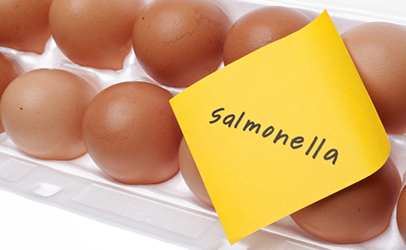 cidence of Salmonella infections in Australia has prompted health officials Down Under to warn the public about the risks of consuming raw or undercooked eggs.
cidence of Salmonella infections in Australia has prompted health officials Down Under to warn the public about the risks of consuming raw or undercooked eggs.According to a story published Tuesday at Good Food.com.au, Salmonella cases in Australia have almost doubled in the past 10 years from about 7,000 cases in 2003 to nearly 13,000 cases last year.
The Department of Health in Victoria, a state-level agency, notes that, “Salmonella bacteria are found in humans and in wild, farm and pet animals and birds, particularly chickens. … As Salmonella infection of chickens is common, the bacteria can often be found in raw chicken meat and on eggs.”
The most recent Salmonella outbreaks in Australia are raw egg-related, particularly involving mayonnaise. In February 2014, more than 200 people were sickened after eating at a café in Torquay, a seaside area near Melbourne, and several others were sickened around the same time after dining at a hotel in St. Kilda, a Melbourne suburb.
Those two outbreaks were sourced to raw eggs produced at a Victoria farm, which has had its sales restricted until making operational changes such as washing all eggs for sale and improving cleanliness in laying sheds.
In Brisbane in 2013, 220 people became ill and one woman died following a luncheon, and another 140 people were sickened after eating in an Canberra restaurant on Mother’s Day.
Dr. Rosemary Lester, Victoria’s chief health officer, warned that certain foods and drinks containing raw or undercooked eggs have been linked to several previous Salmonella outbreaks in the area. These dishes include mayonnaise, aioli, mousse, eggnog and tiramisu.
“These foods can be a risk, especially for the elderly and people with lowered immunity, children and pregnant women,” she said, adding that eggs should be cooked “until they were hot all the way through” to make sure they are safe to consume.
Salmonella is caused by a bacterium and can affect anyone, but particularly susceptible are children younger than five, young adults, seniors and those with existing health problems. Symptoms of salmonellosis are diarrhea containing blood or mucus, fever, stomach cramps, nausea, vomiting and headache.
Symptoms can take between six and 72 hours to show up after contact with the bacteria and can take several days to run their course. Hospitalization can occur, especially if the affected person becomes dehydrated. Salmonella can be transmitted from inadequately cooked food, cross-contamination or from person-to-person contact.





